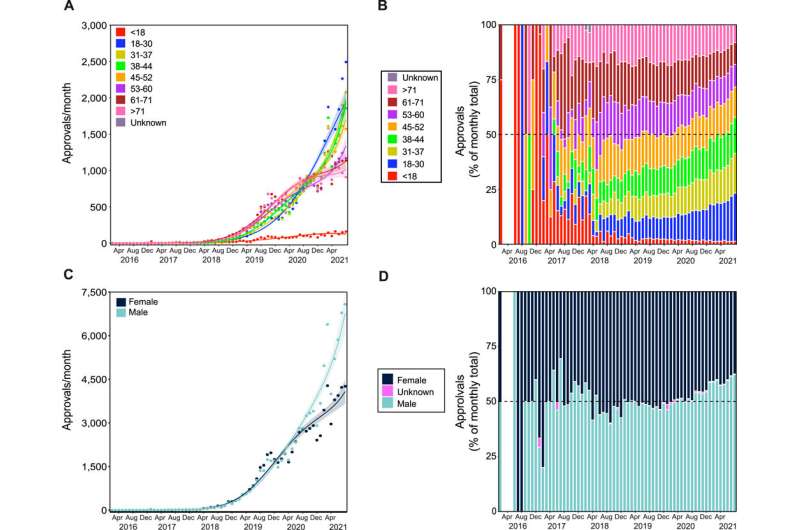First comprehensive study reveals why Australians take medicinal cannabis

Of the 248,000 scripts approved for Australians since the inception of the national medicinal cannabis scheme in 2016, many related to conditions for which the drug has limited evidence of efficacy, a new University of Sydney study shows.
The first in-depth study of Australia's medicinal cannabis program, which began in 2016, shows the drug is being increasingly prescribed for various conditions. Since the beginning of the program, medicinal cannabis has been prescribed for more than 140 conditions.
The study, led by the University of Sydney's Lambert Initiative for Cannabinoid Therapeutics, found anxiety was among the top three reasons for a medicinal cannabis prescription. This is despite a limited number of high-quality clinical trials investigating the drug's efficacy for this condition.
The findings were published today in Frontiers in Pharmacology.
Flower-based cannabis products containing THC (the ingredient that makes you "high") were being prescribed for anxiety, particularly to males aged 31 or younger.
However senior author Dr. Elizabeth Cairns said the current evidence base for medicinal cannabis for anxiety is limited to only a few studies investigating CBD-dominant products, rather than THC-containing products
"Historically, the effects of THC have been described as anxiety-inducing, although this may depend on dose size and other factors."
Using data from the Therapeutic Goods Administration (TGA)—Australia's Special Access Scheme B, the researchers found the other two top reasons for prescriptions were pain and sleep disorders.
The evidence of effectiveness for medicinal cannabis in the treatment of pain is controversial, at least in Australia, where the Australian Faculty of Pain Medicine suggests not to prescribe medicinal cannabis for this purpose. Very few studies have also been done examining cannabis for the treatment of sleep disorders.
Medicinal cannabis as a last resort
Study co-author and medicinal cannabis prescriber in her capacity as a GP, Associate Professor Vicki Kotsirilos AM from Western Sydney University, says the top reasons for prescriptions didn't surprise her.
"Pain, anxiety and sleep issues are often interconnected—chronic pain can also cause mental health and sleep issues."
Although Associate Professor Kotsirilos prescribes medicinal cannabis for pain, she says this should only be done as a last resort, after more evidence based behavioral and drug therapies, such as counseling, exercise and deep breathing for pain, anxiety and/or sleep disorders, have failed or are of limited clinical benefit.
Sydney-based writer Rocky, 31, embodies this process. She exhausted her other medical options and tried self-medicating with cannabis before turning to medicinal cannabis over two years ago. She also suffers from endometriosis, which in turn caused her depression and anxiety.
"Medicinal cannabis has been so effective I don't even think about other therapies," Rocky said. "Now, I am able to function completely normally."
Queensland a prescription hotspot
The top reasons for prescriptions surprised the researchers as did the finding that medicinal cannabis prescriptions have increased significantly since 2020—more than 85 percent of total prescriptions to date have been given since January 2020. The researchers are currently unable to say whether the rise was pandemic related.
A similarly inexplicable finding was the fact that Queensland prescribers were responsible for over half of prescriptions nationally, which far outpaced per capita prescribing in other states.
The TGA's extensive medicinal cannabis dataset, which includes 248,000 approved scripts, is the only one of its kind globally. No other country has monitored prescriptions in this way since the inceptions of their medicinal cannabis programs.
The size of the dataset allowed the researchers to find prescribing patterns in small, but significant, populations that otherwise might have been overlooked.
"Apart from the link between anxiety and flower products, we found other interesting associations, for example, prescriptions of topical CBD for convulsions," Dr. Cairns said.
"This usage has not been extensively explored."
The authors note, however, that the data doesn't include patient outcomes.
Dr. Cairns said: "Unfortunately, we just don't know if these treatments were effective for these patients, but this data highlights where we can focus our attention next—to do focused studies and/or clinical trials."
"There is a clear, unmet need for effective drug treatments across a variety of conditions that may be being helped with medicinal cannabis. For example, it could be worth conducting high-quality clinical trials on the use of flower products for anxiety, and that is certainly something that the Lambert Initiative and its collaborators may look to do in future."
Dr. Cairns notes that the Lambert Initiative recently completed trials using CBD for anxiety (in partnership with Orygen), and with cannabinoids for insomnia (in partnership with the Woolcock Institute, and led by Lambert Initiative Research Fellow Anastasia Suraev).
More information: Sara L. MacPhail et al, Medicinal Cannabis Prescribing in Australia: An Analysis of Trends Over the First Five Years, Frontiers in Pharmacology (2022). DOI: 10.3389/fphar.2022.885655




















